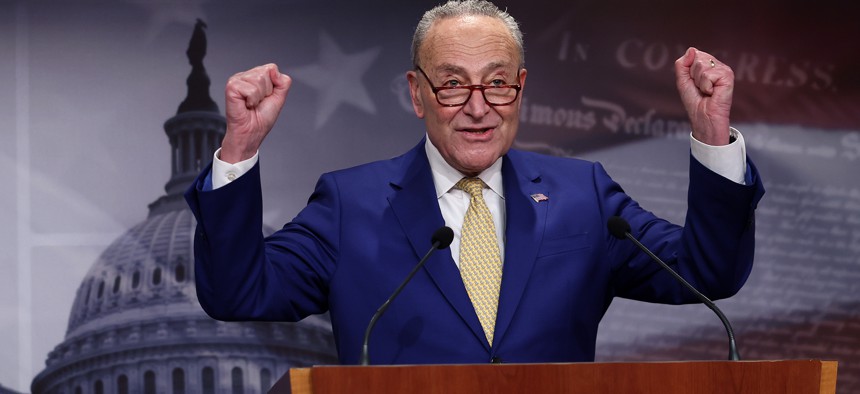Senate approves six spending bills, averts partial government shutdown

Democratic Senate Majority Leader Chuck Schumer of New York was happy to get funding for WIC in the package of bills. Kevin Dietsch via Getty Images
Counties praised the package for addressing Medicaid access for the incarcerated. Now, congressional negotiators turn to the remaining six spending bills, which will determine the future of internet subsidies and other significant programs.
Congress finally stopped kicking the can down the road Friday evening when the Senate passed six spending bills. The 75-22 vote comes after the bipartisan passage of the same bills in the House on Wednesday.
After roughly eight months of uncertainty and three continuing resolutions, federal spending for the current fiscal year has been determined for several agencies, most notably the housing and transportation departments. In addition, the package of bills addresses a major concern of counties: states removing people from Medicaid when they are incarcerated.
Counties, which operate 3,000 jails around the country holding 7.3 million people, have argued that removing people with mental health, substance abuse problems and chronic health issues from the program means they don’t get the help they need while incarcerated. As a result, once released, they are more likely to die from overdoses, reoffend and end up back in jail.
The thousand-page package of spending bills passed by Congress rectifies this issue, in part, by barring states from removing people from Medicaid while they are jailed. The change would provide “better outcomes” by creating more “continuity of care” when they are released, said Matthew Chase, CEO and executive director of the National Association of Counties, or NACo, during a meeting with Route Fifty in February.
“Hopefully, if individuals are getting care, particularly for mental health and substance use disorder treatment, it will reduce the amount of recidivism and people coming back into the correctional setting upon their release,” said Robin Rudowitz, vice president and director of the Medicaid and uninsured program at KFF, formerly the Kaiser Family Foundation.
The reform, however, does not go as far as counties wanted. While it bars states from removing incarcerated Medicaid recipients from coverage, federal law still requires that coverage is suspended while they are in jail. "The county bears the costs while they're not on Medicaid,” said Mark Ritacco, chief government affairs officer for NACo. “That puts a fiscal constraint on counties who are now the primary mental health care provider for a lot of these people.”
Counties have been pushing to eliminate the federal law. “It’s also a fairness issue,” he said, noting that many of the people who are in jail but not yet convicted would still have their Medicaid suspended.
The Biden administration has tried to address the issue by encouraging states to seek waivers from the law. It approved a California proposal in January that allows inmates in the state’s prisons and county jails to be eligible for Medicaid beginning 90 days before they are released if they are at high risk of adverse health, including those with mental health and other chronic conditions.
Under the waiver, inmates will be able to receive case management, physical and behavioral health consultation, laboratory and radiology services, and medications, such as those for opioid use disorders.
Waivers have also been approved in Washington state and Montana that allow people to be eligible for Medicaid a month before they are released. Another 17 states are also seeking waivers, according to KFF. A change in the law, though, could make Medicaid available to inmates in all of the states.
In terms of funding, the bills roughly keeps spending at last year’s levels. But they include additional money for rental assistance and for states to continue providing food assistance to low-income women and their children through the Special Supplemental Nutrition Program for Women, Infants, and Children, or WIC. And they cuts several programs including the main grant program for states to build affordable housing.
Congress’ work is far from over, however. With the passage of these six spending bills, lawmakers now must focus on reaching an agreement on the remaining six appropriations bills by March 22.
Among the issues at stake is whether 23 million low-income households will lose a $30-a-month subsidy to help them pay for internet service. The Federal Communications Commission estimates that about 17 million families could lose or see disruptions to their internet access should the Affordable Connectivity Program end.
Congress must also decide whether to provide additional funds to religious advocacy organizations like the Anti-Defamation League to help places of worship protect themselves from attacks amid a surge in hate crimes. A bill passed by the Senate last month to send aid to Ukraine and Israel and humanitarian relief to Gaza would provide an additional $160 million in so-called Nonprofit Security Grants to help synagogues and mosques bolster security.
The grants, overseen by the Federal Emergency Management Agency, can be used to install security cameras and hire guards. But the House has not yet agreed to the package, something advocates are hoping will change during the upcoming negotiations.
Kery Murakami is a senior reporter for Route Fifty, covering Congress and federal policy. He can be reached at kmurakami@govexec.com. Follow @Kery_Murakami
NEXT STORY: Big Oil faces a flood of climate lawsuits—and they’re moving closer to trial






